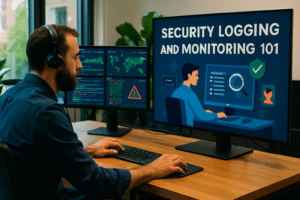
Intro to ethical hacking
In the digital age, the boundaries between security and vulnerability are often razor-thin. Networks, applications, and even simple websites can become gateways for malicious actors, threatening organizations and individuals alike. Yet, within this dynamic landscape, a new breed of professionals has emerged—those who use their technical prowess not to exploit, but to protect. Welcome to the world of ethical hacking.
What Is Ethical Hacking?
At its core, ethical hacking is the practice of probing systems, networks, or applications for vulnerabilities—with explicit permission—to identify and fix potential weaknesses before they can be exploited by malicious hackers. These professionals, often called white-hat hackers or penetration testers, play a crucial role in the cybersecurity ecosystem.
Ethical hackers think like attackers, but act as guardians.
This discipline requires not only a deep technical understanding but also a strong sense of responsibility and ethics. The primary goal is not to cause harm or gain unauthorized access for personal gain, but rather to help organizations strengthen their defenses.
Why Is Ethical Hacking Legal?
Many newcomers to the field are surprised to learn that hacking can, in fact, be legal. The key difference lies in consent. Ethical hackers operate under clear agreements, often formalized with contracts known as Rules of Engagement. These documents outline the scope, methods, and limitations of the assessment, ensuring that all parties understand what is—and is not—allowed.
As a result, ethical hacking is not only legal but also highly sought after. Organizations from banks to government agencies to tech startups hire ethical hackers to proactively identify and address vulnerabilities. This proactive approach has become a cornerstone of modern cybersecurity strategies.
Skills and Mindset: What Does It Take?
Becoming an ethical hacker requires a blend of technical skills, curiosity, and ethical integrity. The field welcomes individuals from diverse backgrounds, including those who are neurodivergent, women, and people pivoting into tech from entirely different careers.
Technical Foundations
At a minimum, aspiring ethical hackers should possess:
- Networking knowledge: Understanding TCP/IP, DNS, firewalls, and network protocols.
- Operating systems: Familiarity with Linux and Windows environments.
- Programming/scripting: Experience with languages like Python, Bash, or PowerShell.
- Web technologies: Grasping how web applications function, including HTTP, cookies, and sessions.
However, technical prowess alone is not enough. The most effective ethical hackers are those who combine their knowledge with insatiable curiosity and a methodical approach to problem-solving.
The Importance of Ethical Integrity
Ethical hacking is built on trust. Organizations rely on hackers to act responsibly, respecting data privacy and legal boundaries. This means never exceeding the authorized scope, never exploiting discovered weaknesses for personal gain, and always reporting findings transparently.
“With great power comes great responsibility.” This is more than a cliché for ethical hackers; it’s a guiding principle.
Getting Started: Pathways into Ethical Hacking
The journey into ethical hacking can seem daunting, but it’s more accessible than many expect. Here are key steps to begin:
1. Build a Strong Foundation
Start with the basics of networking, operating systems, and web development. Free resources abound, including online courses, open-source textbooks, and interactive labs. Platforms like TryHackMe and Hack The Box provide hands-on environments to practice legally and safely.
2. Learn Security Concepts
Understanding how attacks work is essential. Study topics like:
- Common vulnerabilities (SQL injection, XSS, CSRF, buffer overflows)
- Cryptography basics
- Authentication and authorization mechanisms
Explore resources such as the OWASP Top Ten to familiarize yourself with the most prevalent web security risks.
3. Practice, Practice, Practice
Hands-on experience is indispensable. Set up a home lab using virtual machines, or participate in Capture The Flag (CTF) competitions. Many CTFs are beginner-friendly and offer challenges that mimic real-world scenarios.
4. Earn Certifications
Certifications can demonstrate your expertise and commitment to potential employers. Popular certifications include:
- Certified Ethical Hacker (CEH)
- Offensive Security Certified Professional (OSCP)
- CompTIA Security+
While not strictly necessary, certifications can open doors, especially for those without a traditional computer science background.
5. Join the Community
The ethical hacking community is vibrant and inclusive. Participate in forums, attend conferences (many are virtual and free), and contribute to open-source projects. Connecting with others not only provides support and inspiration but also helps you stay current in this fast-evolving field.
Women and Neurodivergent Individuals in Ethical Hacking
The technology industry, including cybersecurity, has historically been male-dominated. However, the tide is turning. More women and neurodivergent individuals are entering the space, bringing unique perspectives that enrich the field.
Diversity is not just a buzzword—it’s a catalyst for innovation.
Women and neurodivergent people often excel in ethical hacking because of their attention to detail, persistence, and unconventional problem-solving approaches. Organizations are beginning to recognize the value of diverse teams, especially in roles that require creativity and lateral thinking.
Mentoring programs, scholarships, and dedicated networking groups are making ethical hacking more accessible than ever. If you’re considering this path and don’t see many people like yourself, know that the community is eager to welcome you.
Learning Resources and Safe Practice
One of the most common questions from beginners is how to practice hacking legally. The answer lies in dedicated platforms and environments designed for learning. These include:
- TryHackMe: Guided paths for beginners and advanced users alike.
- Hack The Box: Realistic challenges and machines to “hack” in a controlled environment.
- OverTheWire: Classic war games focused on Unix/Linux skills.
- VulnHub: Downloadable vulnerable virtual machines for offline practice.
- OWASP Juice Shop: A deliberately insecure web app for testing web hacking skills.
Never attempt to hack real-world systems without explicit permission. Even well-intentioned probing can be illegal and result in serious consequences.
A Note on Bug Bounty Programs
Many companies run “bug bounty” programs, inviting ethical hackers to find and report vulnerabilities in exchange for rewards. Platforms like HackerOne and Bugcrowd connect hackers with organizations seeking help. These programs have strict rules—always read and follow the guidelines to ensure your work remains legal and appreciated.
The Evolving Landscape of Ethical Hacking
Technology never stands still, and neither do the threats facing digital systems. As cloud computing, artificial intelligence, and the Internet of Things (IoT) expand, the attack surface grows ever wider. Ethical hackers must therefore commit to lifelong learning, adapting to new technologies and emerging risks.
One of the most exciting developments is the convergence of ethical hacking with fields like data science and machine learning. For example, machine learning models can help identify network anomalies or predict likely attack vectors. At the same time, attackers are experimenting with AI-driven attacks, raising the stakes for defenders.
Another critical shift is the increasing emphasis on privacy. As regulations like GDPR and CCPA reshape how data is handled, ethical hackers must understand not only technical vulnerabilities but also compliance obligations.
Ethical Hacking as a Force for Good
At its heart, ethical hacking is about more than just technology—it’s about trust. It’s about creating safer digital spaces where people can communicate, learn, and innovate without fear. Ethical hackers are the quiet champions behind the scenes, using their skills to make the internet a better place.
The best ethical hackers are driven not by ego, but by a desire to help and protect.
For those passionate about making a difference, ethical hacking offers a rare combination of intellectual challenge, real-world impact, and community. Whether you are a seasoned technologist or just beginning your journey, your unique voice and perspective can help shape the future of cybersecurity.
Embracing the Journey
The path to becoming an ethical hacker is rarely linear. It’s filled with technical puzzles, ethical quandaries, and moments of doubt—but also with discovery, growth, and a profound sense of purpose. There is room here for everyone: the methodical analyst, the creative problem-solver, the curious beginner.
As technology continues to evolve, so too will the role of ethical hackers. Their skills will be needed not just to defend, but to innovate, educate, and inspire. If you’re ready to explore this world, know that you bring something valuable simply by showing up.
So, whether you’re drawn by a fascination with code, a desire to protect others, or a vision for a more inclusive digital world, ethical hacking is a field where you can thrive. With each vulnerability you uncover and each solution you craft, you become part of a global movement—one that cherishes curiosity, values integrity, and believes in the transformative power of technology.


